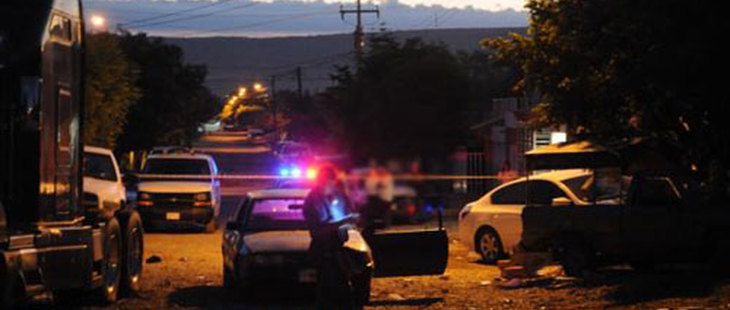
When you think of Mexico, what is the first picture that comes to your mind? For many people, they would probably conjure up an image of a warm sand beach lined with chairs and umbrellas, next to crystalline turquoise waters and a bright sky. That was the first image shown in a slideshow by Luis Horacia Najera. The Mexican journalist appeared at Ryerson University last Wednesday evening to give a presentation entitled “Organized Crime in Latin America: More than Drugs, Bullets and Blood”. The second slide showed graphic images of bodies lying in streets watched over by police officers. “The problem is deeper than just blood, drugs and bullets,” says Najera. “The whole country is a battle.” The talk was the fifth lecture in the International Issues Discussion series, a student-lead forum organized and hosted by two Ryerson students and history professor Dr. Arne Kislenko. During his twenty one years as a journalist, photographer and editor, Najera covered drug traffic organizations, illegal immigration into the U.S., political corruption and impunity and human rights abuses by the military in Latin America and the state of Chihuahua where he lived. He was also the first journalist to report on the disappearance of women in Cuidad Jurez in 1985. Najera fled to Canada as a refugee in 2008 after receiving threats on his life. Najera’s subject matter couldn’t have been any more timely. Earlier this week, Mexico’s Los Zetas drug cartel killed a blogger associated with the website Nuevo Laredo En Vivo, the latest in a string of attacks on citizen journalists posting online about the criminal organizations. The man was found beheaded at a busy intersection with a nearby note reading, “This happened to me for not understanding that I shouldn’t report on the social networks.” The Committee to Protect Journalists (CPJ) reports that between 1992 and 2001, 243 journalists have been killed in Latin America, the majority of these deaths drug gang-related. These killings range from car bombings to highly public executions. For Najera these numbers are more than just statistics though. “These were my colleagues,” he says, as he points to another slide showing more lifeless bodies. “There are some areas where there is no press.” There are seven major criminal organizations in Mexico; Beltrn Leyva Cartel, Sinaloa Cartel, Juarez Cartel, Knights Templar Cartel, Tijuana Cartel, Gulf Cartel and the aforementioned Los Zetas Cartel. The Sinaloa Cartel’s current leader, Joaqun “El Chapo” Guzmn, is the FBI and Interpol’s most wanted man following Osama Bin Laden’s death this past May. He was also ranked as the 55th most powerful person in the world in this year’s Forbes “The World’s Most Powerful People” list. These organizations?which exist in Chile, Columbia, El Salvador, Honduras and other countries in Latin America? are involved in illegal activities ranging from firearms smuggling to the bulk of the world’s production and distribution of cocaine, marijuana and methamphetamine. Najera says that individuals, including a staggering amount of young people, get involved with these cartels because they feel they have no other choice. Fictionalized depictions of these ongoing conflicts in Latin America have also made their way onto screens small and large in the past few years. Take Breaking Bad for example, the Emmy Award-winning television drama series, which is about a high school chemistry teacher named Walter White who is forced to produce and sell meth to afford his expensive cancer treatments. While set in Albuquerque, New Mexico, the show’s characters frequently do business and interact with violent Mexican drug cartels and their bosses. Miss Bala, a drama about a beauty pageant contestant kidnapped by gangsters, debuted to mixed reviews at this year’s Toronto International Film Festival. “This does not change the public’s perception,” says Najera, “The bad guys are still the Mexicans.” When asked by an audience member if he felt safe now that he was in Canada, Majera’s answer was brief. “No,” he says, “The day that I feel safe, I’m done.” Since arriving here, he has been doing talks on these issues and working with non-profit organizations such as Reporters Without Borders dedicated to defending freedom of expression for journalists. Several times throughout his presentation, Najera admitted his skepticism towards whether or not outside assistance from other countries and international organizations would help solve Latin America’s problems. “These changes need to start from within society,” he says, “If a society is paralyzed by fear, there is impunity.” “You have to flip the pyramid and work with education instead of trying to catch the bad guys.” With his closing words, Najera made a solemn plea to those in attendance. “I’m not implying that anyone here does drugs,” he says, “But if you do, or have friends that do, please think about it. The drug you are using is killing people in my country.”














